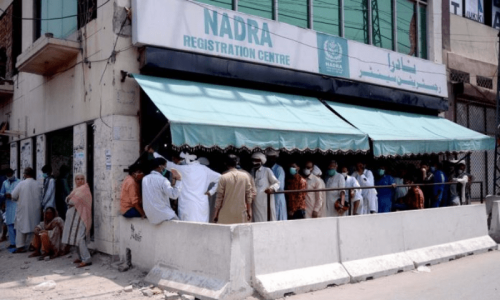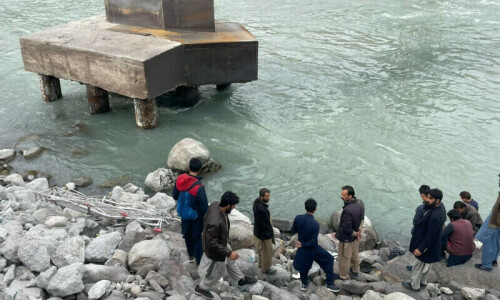RAWALPINDI, Jan 27: Though Punjab is likely to achieve the Millennium Development Goals (MDGs) by 2015, the government is sceptical about the province achieving the targets of maternal mortality ratio (MMR) in the absence of a major health sector reform, an official report says.
The key health MDG indicators for Punjab show a declining trend as infant mortality rate per 1,000 live births, which was 77 in 2003-04, reduced to 71 in 2006-2007 and is expected to be 40 by 2015. The under-five mortality rate per 1,000 live birth was 112 in 2003-04 and reduced to 102 in 2006-07, whereas by 2015 it is projected to be 47. However, maternal mortality ratio per 100,000 live births was 300 in 2003-04 and it remained at the same level in 2006-07.
The percentage of fully-immunised children (12 to 23 months old) which was 50 in 2003-04 increased to 79.9 against the target of above 80 by 2015.
The report says the reasons for the high maternal mortality are likely to be complex. The most immediate causes are lack of access to quality primary and secondary health care including ante-natal care. According to the 2006-07 demographic and health survey, only 60 per cent of women had at least once met a health worker during pregnancy. And only 36 per cent of deliveries took place with health worker’s assistance while 33 per cent of deliveries were conducted in health facilities.
Tetanus vaccination is far from universal. High-maternal mortality is a reflection of low-standing of women in society. The situation is worse among the uneducated, poorer women in the rural areas, the report points out.
Physical access to health care remains to be a problem while the number of primary health care facilities has increased in recent years. Not only distance to health care facilities but also the availability of health workers is a serious issue. Trained birth attendants are not available in adequate number and traditional birth attendants still appear to be influential in rural communities.
The report says health care expenditure, especially by the public sector, is meagre compared to even other developing countries. Pakistan’s health care expenditure is only 2.2 per cent of GDP, more than 98 per cent of which is out of pocket expenditure or only 2.7 dollars per capita on health care.
The problem of under-investment is further compounded by the intricate financial arrangements involving the federal, provincial and district governments. The 2001 devolution of social services has made the district governments responsible for health service delivery without sufficient allocation of resources or authority. While the conditional grant mechanism has augmented district government budget for social services, its effects on improving health outcomes remain to be seen, the report says.
The Punjab government has recognised that a comprehensive reform of the health sector was needed in order to improve health outcomes, especially to achieve the MDG goals. The Health Sector Reform Framework (HSRF) has been prepared by the Punjab government to set forth a comprehensive ambitious health sector reform and required activities.
The HSRF has been translated into a Health Sector Reform Programme (HSRP) under which the health department has established the HSRP management unit, and started programme implementation during the current fiscal year (2007-08).
However, health care financing is likely to be a major issue. In line with the policy emphasis on social services provision, the Punjab government has made hefty budgetary allocations for the health sector. The revised expenditure on health amounted to Rs20.12 billion in FY-2005 compared to Rs6.93 billion in FY-2002, an average compounded growth of 42.7 per cent per annum. According to the MTDF, the total health expenditure allocation will rise to Rs6.5 billion by 2008.











































Dear visitor, the comments section is undergoing an overhaul and will return soon.